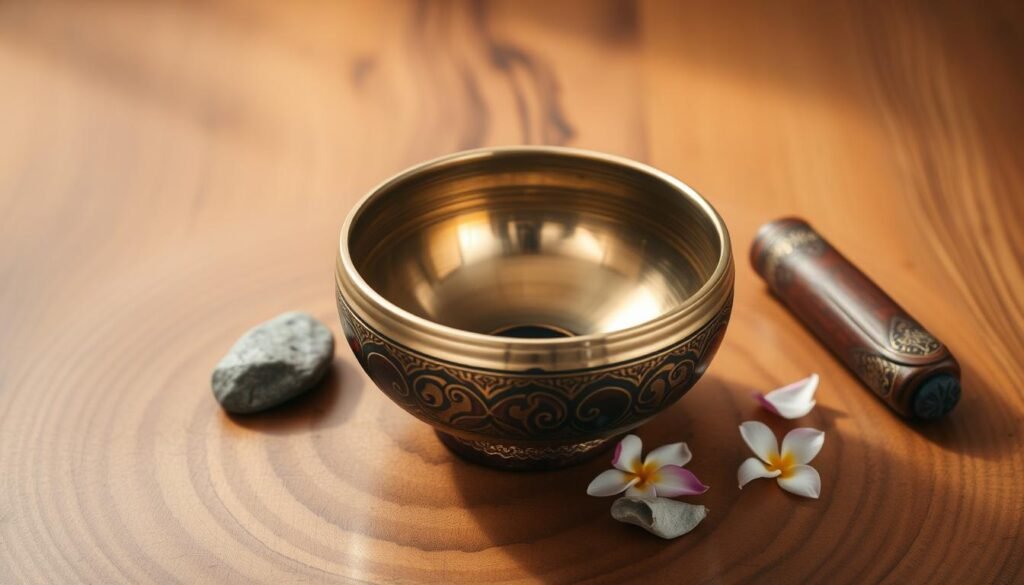
The gentle chimes of my Tibetan singing bowl fill the air, creating a soothing atmosphere. The resonant tones vibrate through me, easing my day’s stress. This Tibetan Singing Bowl Set for Sound Therapy tool is key to my self-care, a healing space in our busy world.
Like me, you might be drawn to Tibetan singing bowls and their healing effects. These ancient tools have been used for centuries in Tibetan Buddhist practices. Now, they’re recognized for their benefits in sound therapy and holistic healing.
In this guide, we’ll dive into the history and benefits of Tibetan singing bowls. We’ll also share how to use them for healing in your life. This article is for anyone looking to relax, grow, and find deeper awareness through sound therapy.
Key Takeaways
- Tibetan singing bowls are ancient instruments used for centuries in Buddhist practices for their healing and meditative properties.
- These bowls are crafted from a unique blend of metals, each producing its own distinct tone and vibration.
- Incorporating Tibetan singing bowls into your self-care routine can provide stress relief, enhanced relaxation, and deeper meditation experiences.
- Choosing the right singing bowl set for your needs and goals is crucial for maximizing the benefits of sound therapy.
- Proper techniques for playing and maintaining your Tibetan singing bowls are essential for unlocking their full healing potential.
What are Tibetan Singing Bowls?
Tibetan singing bowls, also known as “meditation bowls” or “Himalayan singing bowls,” are ancient musical instruments. They have been used for centuries in spiritual and healing practices. When struck or rubbed, they produce a mesmerizing, resonant tone. This creates a calming and meditative atmosphere.
Historical Background of Singing Bowls
The origins of Tibetan singing bowls go back to ancient Tibetan and Himalayan Buddhist traditions. These bowls were used in religious ceremonies, meditation, and rituals. Their soothing sounds were believed to promote inner peace and spiritual enlightenment.
Over time, the use of singing bowls has spread worldwide. Now, they are a popular tool for sound therapy and relaxation practices.
Materials Used in Crafting Bowls
- Bronze: Traditionally, Tibetan singing bowls were crafted from an alloy of bronze, which produces a deep, resonant tone.
- Copper: Some singing bowls are made from pure copper, which results in a brighter, more metallic sound.
- Crystal: More recently, crystal singing bowls have become popular, offering a unique and ethereal tone with a longer sustain.
The material used in a singing bowl affects the sound quality and its aesthetic and energetic properties. Crafting these instruments is a highly skilled and meticulous process. It is often passed down through generations of artisans.
Benefits of Sound Therapy with Singing Bowls
Using vibrational therapy with Tibetan mindfulness bowls brings many health benefits. It helps reduce stress and improves meditation. The sounds of these ancient instruments are truly transformative.
Stress Relief and Relaxation
The calming sounds of Tibetan singing bowls deeply affect our stress levels. They lower cortisol, the stress hormone, leading to relaxation and well-being.
Research shows these bowls’ sounds can align brain waves, entering a meditative state. This state reduces mental and physical tension. It also improves sleep, focus, and overall calmness.
Enhanced Meditation Practices
Adding Tibetan singing bowls to meditation deepens the experience. Their soothing sounds quiet the mind, helping to focus and be present.
- The bowls’ harmonious tones create a trance-like state, connecting us with ourselves and nature.
- Mindfulness bowls guide the breath, anchor the senses, and bring inner peace and clarity.
- Regular meditation with singing bowls enhances emotional control, empathy, and overall well-being.
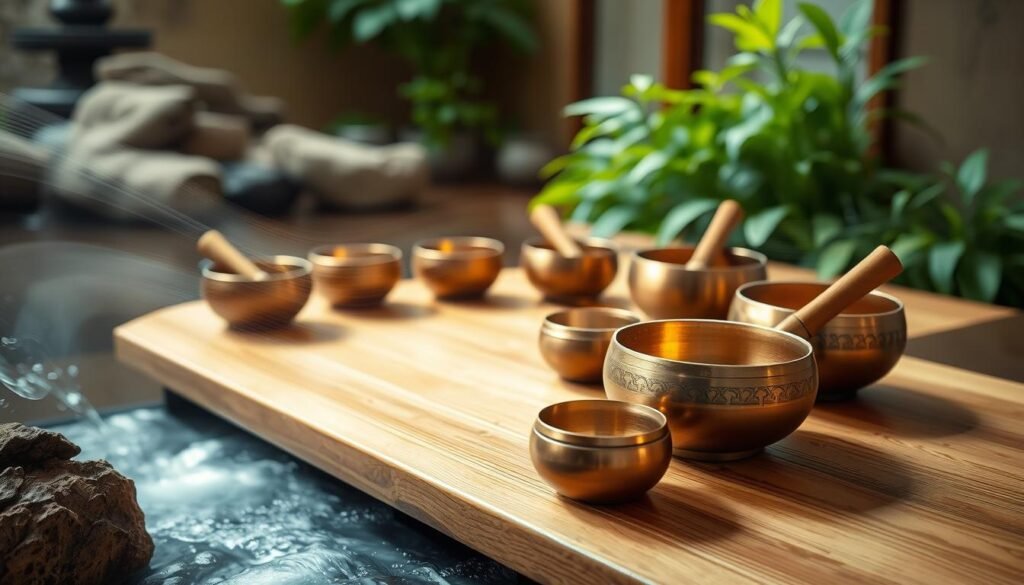
Sound therapy with Tibetan singing bowls unlocks many benefits. It brings relaxation, focus, and personal growth.
How to Choose the Right Singing Bowl Set
Finding the right singing bowl set is a journey that can change your life. These tools help align your chakras and bring deep relaxation and healing. Whether you prefer the tones of metal singing bowls or the earthy sounds of chakra bowls, the right choice can take your sound therapy to new levels.
Consider Your Purpose and Goals
Before starting your search for singing bowls, think about what you want to achieve. Do you want to deepen your meditation practice? Or maybe you’re looking to reduce stress and find inner peace? Perhaps you’re interested in using them for energy healing and balancing your chakras. Knowing your goals will help you find the perfect set for your journey.
Different Sizes and Frequencies
Singing bowls vary in size, each with its own frequency and energy. Smaller bowls, often used for chakra work, have higher tones that target specific energy centers. Larger metal singing bowls produce deeper sounds that help you relax and reflect deeply.
When picking your singing bowl set, think about the size and frequency that fits your goals. Try out different bowls to find the ones that connect with you the most.
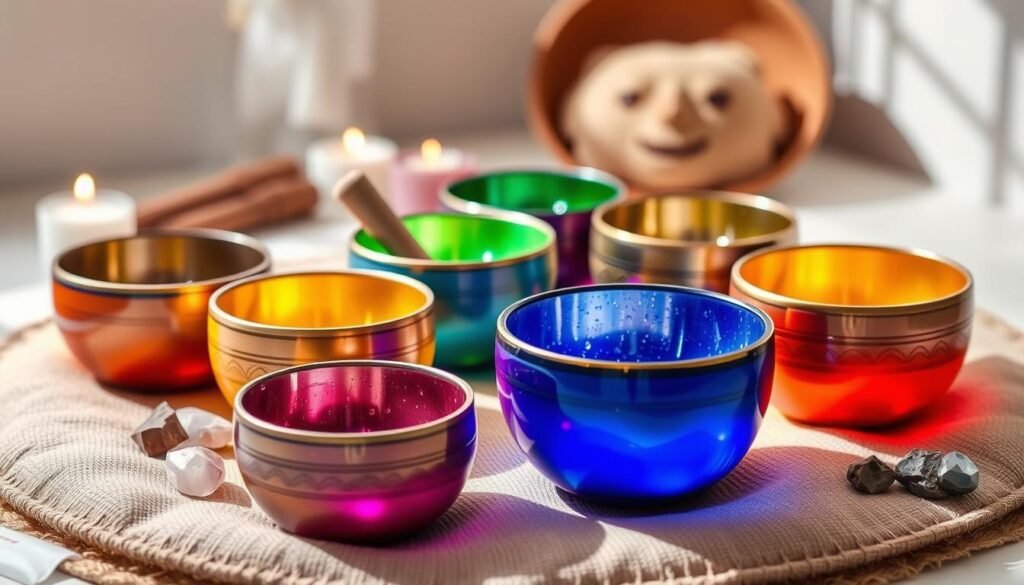
| Bowl Size | Frequency Range | Ideal Use |
|---|---|---|
| 3-4 inches | 250-500 Hz | Chakra balancing, meditation |
| 5-7 inches | 150-300 Hz | Stress relief, relaxation |
| 8-10 inches | 100-200 Hz | Deep healing, spiritual exploration |
Choosing the perfect singing bowl set is a personal journey. By matching your choices to your needs and goals, you can unlock the power of these ancient tools. This journey will lead you to self-discovery and well-being.
Setting Up for Sound Therapy Sessions
Creating the perfect environment for sound therapy sessions with relaxation bowls and sound healing bowls is key. It sets the stage for deep relaxation, enhanced meditation, and self-discovery. The right ambiance is crucial for a transformative experience.
Creating a Calm Environment
To set up a successful sound therapy session, create a serene atmosphere. Choose a quiet, distraction-free space that promotes peace and focus. Dim the lights and use soft, warm hues.
Incorporate soothing elements like candles or aromatherapy for a calming sensory experience.
Tools to Enhance the Experience
- Comfortable seating options, such as cushions or yoga mats, to ensure your body is supported and aligned during the session.
- Soft, cozy blankets to keep you warm and grounded as you immerse yourself in the healing sounds.
- Incense or essential oils to complement the soothing vibrations of your sound healing bowls.
- A timer or clock to help you track the duration of the session and ensure a seamless transition back to the present moment.
By thoughtfully crafting the environment and using these tools, you can create a sanctuary. This sanctuary amplifies the restorative power of sound therapy. It helps you achieve deep relaxation and inner peace.
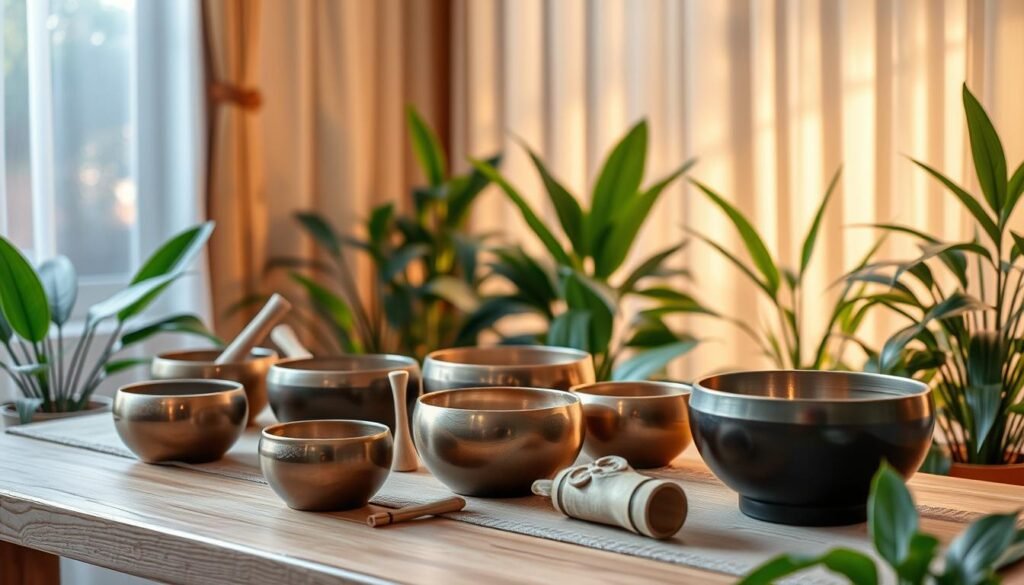
How to Play Tibetan Singing Bowls
Learning to play Tibetan singing bowls is a rewarding part of your sound therapy journey. These bowls create calming tones that help with mindfulness and relaxation. Let’s explore how to play them and make different sounds for your sessions.
Techniques for Striking and Rimming
To start, gently hit the bowl’s side with a mallet or wooden striker. Move the mallet around the rim in a circle. This builds vibrations and makes a soothing sound. Try different ways to strike and rim to get various sounds.
- Hold the bowl in one hand and the mallet or striker in the other.
- Gently strike the side of the bowl near the rim, using a light, controlled motion.
- Slowly move the mallet or striker around the rim of the bowl, applying gentle pressure to create a sustained, ringing tone.
- Vary the speed and pressure of your movements to explore different sound qualities.
Creating Different Sounds and Tones
The Tibetan singing bowl set lets you make many sounds and tones. Change your technique and try different ways to strike and rim. This will help you create sounds that make your sound therapy sessions better.
- Soft, Soothing Tones: Use a gentle, slow rimming motion to produce a calming, resonant sound that can aid in relaxation and meditation.
- Energizing Overtones: Apply more pressure and speed to the rimming motion to generate a brighter, more vibrant tone that can energize and uplift.
- Harmonic Layering: Simultaneously strike the bowl while rimming it to create a layered, complex sound that can deepen your meditative experience.
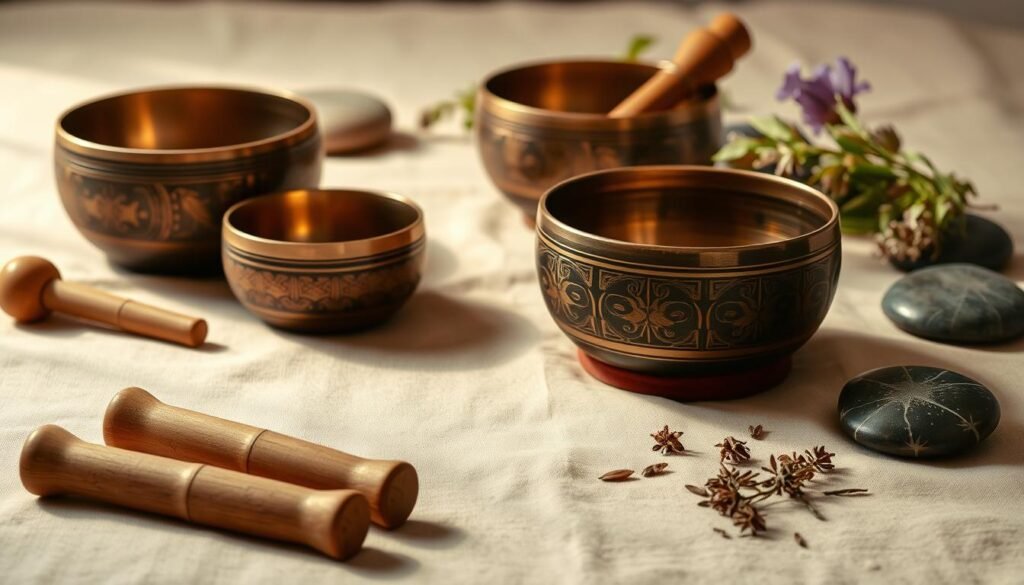
Playing Tibetan singing bowls is a journey of discovery and trying new things. Trust your instincts and let the bowls help you find the sounds that match your goals for sound therapy and meditation.
Integrating Singing Bowls into Meditation
Adding yoga singing bowls to your meditation can greatly improve your mindfulness journey. These instruments create a calming atmosphere. They also help you relax and focus more deeply.
Using Singing Bowls for Mindfulness
The soft vibrations and sounds of mindfulness bowls can help you stay focused during meditation. Listening to these sounds helps you stay present. It helps you ignore distractions and calm your mind.
- Choose a singing bowl that feels right to you, based on its sound, size, or look.
- Use the bowl in your meditation by gently hitting it or running a mallet around it. This creates a soothing sound.
- As you listen, breathe deeply and feel the sound’s vibrations in your body.
Timing and Frequency of Sounds
The timing and frequency of yoga singing bowls in meditation can deeply affect your experience. Try different ways to see what works best for you:
- Start with the bowl to calm your mind and body before meditating deeper.
- Use the bowl at different times in your meditation. It helps keep your focus and guides you back to the present.
- Let the bowl’s sound fade away. Then, enjoy the silence for deep thinking and self-reflection.
Using mindfulness bowls in your meditation can open up new levels of focus, relaxation, and self-awareness. It can improve your overall well-being and personal growth.
Caring for Your Tibetan Singing Bowl Set
It’s important to take care of your Himalayan and metal singing bowls. This keeps their sound quality high and makes them last longer. By using simple cleaning and storage tips, your sound therapy tools will stay in great shape for years.
Cleaning and Maintenance Tips
To clean your bowls, use a soft, dry cloth. Don’t use water or harsh cleaners, as they can harm the metal. For tough spots, try a small amount of coconut or olive oil and buff with a clean cloth.
Check your bowls often for cracks or dents. These can hurt their sound. If you find any problems, get help from a professional.
Proper Storage Techniques
- Keep your bowls in a cool, dry spot, away from sunlight and extreme temperatures.
- Use a special stand or cushion to protect them from scratches and dents.
- When storing multiple bowls, put a soft cloth or padding between them to prevent scratches.
- Store bowls upright to keep their shape and avoid warping.
By following these care tips, your Tibetan singing bowl set will stay in top condition. This means you’ll always have access to the calming and transformative sounds of sound therapy.
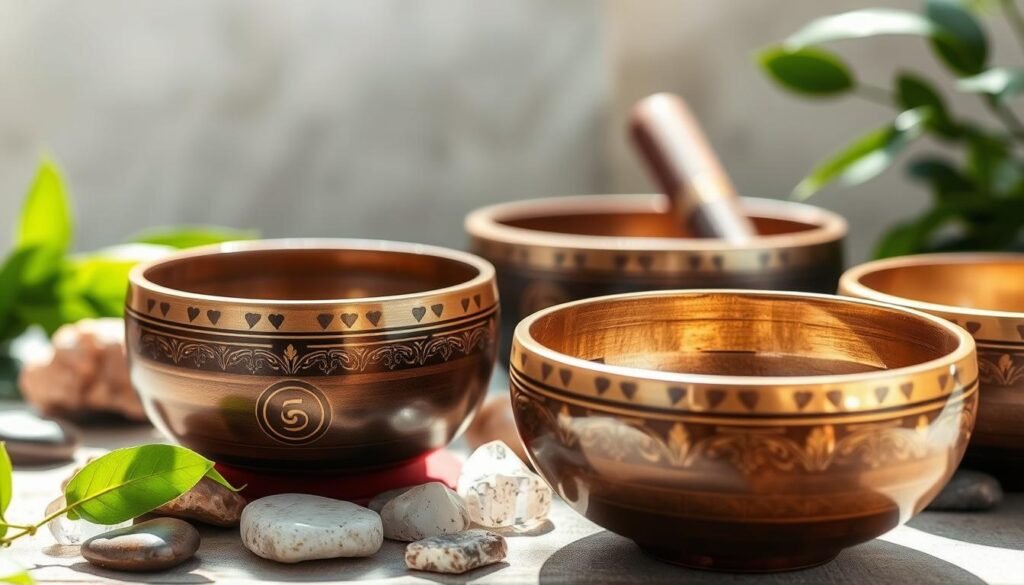
Exploring Other Sound Therapy Tools
There’s more to sound therapy than just Tibetan singing bowls. Gongs and tuning forks are also interesting tools. They work well with singing bowls to help people relax and grow.
Gongs and Tuning Forks
Gongs are known for their deep sounds that help people meditate deeply. They can be used with singing bowls for a special sound bath. Tuning forks, meanwhile, focus on certain frequencies to balance the body’s energy.
Comparison with Singing Bowls
Singing bowls are cozy and calming. But gongs and tuning forks offer something different. Gongs make you feel open, and tuning forks target specific body issues. You can use them alone or with sound healing bowls for a richer experience.
Choosing the right sound tools depends on what you want. Gongs, tuning forks, and Tibetan singing bowls each have their own benefits. Trying them out can make your sound therapy journey more varied and fulfilling.
Real User Experiences with Sound Therapy
Tibetan singing bowls and sound therapy have a powerful effect. Real-life stories from those who’ve used them show their impact. These stories highlight how relaxation bowls and chakra bowls help with wellness, relaxation, and growth.
Testimonials from Practitioners
“As a sound therapy practitioner, I’ve seen the amazing effects of Tibetan singing bowls. One client, dealing with stress and anxiety, found calm and peace with relaxation bowls. The bowls’ vibrations balanced their chakras, letting them release emotions and find clarity.”
“Another client, who meditates a lot, said chakra bowls took their meditation to a new level. The bowls’ tones helped them connect deeply with the present moment.”
Case Studies of Healing Journeys
- A young woman with insomnia found the singing bowls’ sounds helped her sleep well. She woke up feeling refreshed and full of energy.
- A veteran with PTSD saw a big drop in flashbacks and anxiety after sound therapy with Tibetan singing bowls.
- Someone with chronic pain found relief from the bowls’ vibrational frequencies. They felt better physically and emotionally.
These stories show the deep healing power of sound therapy with Tibetan singing bowls. As more people share their experiences, the impact of these ancient tools grows. They inspire others on their journey to wellness and self-discovery.
Finding the Right Resources for Learning
Are you new to Tibetan singing bowls or looking to grow your skills? There’s a lot to learn. You can find online courses, workshops, books, and guides to help you. These resources can open up new ways to understand sound therapy.
Online Courses and Workshops
Today, getting quality lessons is easy. Many online platforms have Tibetan singing bowl courses for all levels. You’ll get videos, meditation sessions, and feedback to improve your skills.
Books and Guides on Sound Therapy
If you like holding books, there are many out there. They cover the history, culture, and healing uses of Tibetan singing bowls. These books offer deep insights and step-by-step guides. They’re great for beginners or those wanting to learn more.
